
Cultural Studies Open Seminar: Cultural Change
 December
11: Chizuko Ueno,
Book talk on Nationalism and Gender. Notes to follow.
December
11: Chizuko Ueno,
Book talk on Nationalism and Gender. Notes to follow.
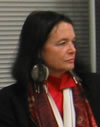 December
4: Anne Waldman,
“Changing the Frequency: New Modal Structures—Poetry and Politics
in Performance.” Notes
to follow.
December
4: Anne Waldman,
“Changing the Frequency: New Modal Structures—Poetry and Politics
in Performance.” Notes
to follow.
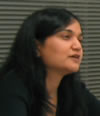 November
27: Sujaya Dhanvantari,
“The Debt of Colonial History: Frantz Fanon.”
Notes to follow.
November
27: Sujaya Dhanvantari,
“The Debt of Colonial History: Frantz Fanon.”
Notes to follow.
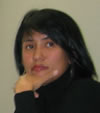 November
20: Tin Tin
Htun, “Cultural Mandate and Motherhood in Japan.” Notes
to follow.
November
20: Tin Tin
Htun, “Cultural Mandate and Motherhood in Japan.” Notes
to follow.
 November
13: Modjtaba Sadria,
“Subaltern Culture and Social Change.” Notes to follow.
November
13: Modjtaba Sadria,
“Subaltern Culture and Social Change.” Notes to follow.
We will be joined in the November 20 seminar by Dr. Tin Tin Htun for her lecture “Cultural Mandate and Motherhood in Japan.” All with an interest are welcome. Students and others are also invited to Professor John Clammer’s lecture at the Policy Studies Forum, “Cultural Change in East Asia: A Comparative Perspective,” Tuesday evening at 6:10.
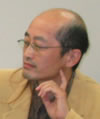 November
6: We were honored to be addressed by Professor Hiroshi
Yoshioka, whose discussion of “How to Do Things with Art”
drew usefully on J. L. Austin’s How to Do Things with Words
and kept our audience engaged with questions and discussion well beyond
the scheduled end of our meeting.
November
6: We were honored to be addressed by Professor Hiroshi
Yoshioka, whose discussion of “How to Do Things with Art”
drew usefully on J. L. Austin’s How to Do Things with Words
and kept our audience engaged with questions and discussion well beyond
the scheduled end of our meeting.
“It is not important to ask ‘What is art?’ A more important question is ‘What can we do with art?’ This doesn’t mean ‘using’ art for some other purpose, but rather thinking ‘with’ art instead of thinking ‘about’ art.”
October 30: No seminar meeting because of the university festival. Next week, Hiroshi Yoshioka, “How to Do Things With Art.”
October 23: Our discussion of the degree to which our lives are or are not “international” was interrupted rather alarmingly by a national issue: the Niigata earthquake. We swayed on the eleventh floor for more than a minute and then distractedly continued discussion.
Students are reminded that the seminar will not meet October 30 because of the university festival. All seminar meetings after that date will have a speaker scheduled, next, on November 6, Hiroshi Yoshioka. Anyone with an interest in Professor Yoshioka’s talk, “How to Do Things With Art,” is welcome.
 October
16: David Ewick,
“Edward Said and the Politics of Cyberspace,” abstract here.
Many thanks to many students and others for turning up for the first of
our formal lectures. A summary of the lecture will follow here in time.
October
16: David Ewick,
“Edward Said and the Politics of Cyberspace,” abstract here.
Many thanks to many students and others for turning up for the first of
our formal lectures. A summary of the lecture will follow here in time.
October 9: Typhoon no. 22, more rain than anyone can remember seeing in one week in Tokyo, seminar cancelled. Next week: David Ewick, “Edward Said and the Politics of Cyberspace.”
October 2: Discussion of the relation of culture and education. Announcement that this second part of the course will include formal lectures by several speakers.
June 5: Discussion of the recent arrest of activists in Tachikawa who had put anti-war flyers into the mailboxes of family members of SDF troops, and the police search of the home of a teacher who had encouraged his students not to sing Kimigayo (the Japanese “national anthem”) at a graduation ceremony.
May 29: Return to the topic of television, initially in reference to the closing “True Lies” section of Sheldon Rampton and John Stauber’s Banana Republicans: Pumping Iron from the May 27 CounterPunch. Discussion also of Jean Baudrillard’s theorization of television and the stages of Simulacra, and, again, dominant and often essentialist images of Japan.
May 22: Dating and culture; symbolic and cultural capital and Japan.
![]() May
15: Q: “What is sacred in your life?”
May
15: Q: “What is sacred in your life?”
A: •meetings with certain people, certain films, certain experiences;
•the people I love and who love me; something transcendental that disappears as soon as I talk about it;
•my bedroom is a sacred place, where I spend most of my time, where I am comfortable;
•my self, because everything relates to me;
•my self is my sacred thing;
•my family, in my home town;
•the way or the right of people to live as they want to live;
•anything that has to do with my life and my worldliness, how I place myself in my own worldliness;
•my self; if I cannot believe myself I cannot live;
•the question is not a concrete thing and is very abstract to me;
•I am not comfortable with religious language, but perhaps an inwardness, the part of me that is most private.
We are socialized to oppose the sacred and the profane, but one way of thinking today is that these are not opposing worlds, that the sacred exists within the profane, that we may bring the sacred into the profane.
Definition: the sacred has been thought of as that which is charged with value, the profane that which is value-less.
But a new way of thinking: we are more and more giving value to everything we do; we act as we do in ordinary life because the acts are meaningful. We have the possibility of seeing all actions as charged with sacred value when we conceptualize our daily acts as the most sacred things we can do.
We have only two possibilities of breaking the dichotomy between sacred and profane:
1) to invest our actions with sacred meaning;
2) to embrace corporate culture, in which the profane, selling an automobile or a laundry detergent, is invested with a false sacredness.
The former is an emancipation, the latter a manipulation.
This is an invitation to ask:
how can we give more meaning to what we do?
And an invitation to consider:
if we give more meaning to what we do we have created new meaning, and if we have created new meaning, in the self-referential terms of this seminar, we have taken a step toward changing culture.
May 8: Return to the question of generalization. How do we avoid generalization and essentialization in practice?
Comments: the practices of scholarship require looking closely at specific cases, which are always immensely complicated (reference to Clifford Geertz’s concept - via Gilbert Ryle - of “thick description”); do we not draw the general from the specific?; do we not reach an understanding of the “thickness” of social or cultural phenomena by looking at counter narratives, or discordant or even deviant cases?
Detour for a moment - no memory now of how
we got there - to  television,
defined as the most sophisticated and articulated form of one-way communication.
We have a passive relation to the communication. We argue with the text
of a newspaper, but television is an act of surrender. Reference to Jean
Baudrillard’s theoretical understanding of television.
television,
defined as the most sophisticated and articulated form of one-way communication.
We have a passive relation to the communication. We argue with the text
of a newspaper, but television is an act of surrender. Reference to Jean
Baudrillard’s theoretical understanding of television.
Back to the question of generalization, particularly in the social sciences. Brief discussion of what is still perhaps the most widely-read book on Japan, Ruth Benedict’s The Chrysanthemum and the Sword (1947), an essentialization of Japanese society and culture written by an anthropologist who was never in Japan, whose only direct sources of information were prisoners of war.
Discussion of the  practice
of Gaston Bachelard, described by Professor Sadria as “the most
important epistemological move in the history of the social sciences.”
Before Bachelard we studied the discrete elements of social phenomena,
but Bachelard’s understanding was that it is not the elements but
rather their relations that comprise the proper study of social phenomena.
practice
of Gaston Bachelard, described by Professor Sadria as “the most
important epistemological move in the history of the social sciences.”
Before Bachelard we studied the discrete elements of social phenomena,
but Bachelard’s understanding was that it is not the elements but
rather their relations that comprise the proper study of social phenomena.
Our practice, as a step away from the tendency to generalize, and following Bachelard, is to clarify that we are talking about social relations, to explain why we’re examining the the particular relations we are, and to discuss the meeting points of these within the society or societies were are discussing.
Participants in the seminar were asked to identify generalities or essentializations of which they have been guilty. No one spoke for a time. Finally, we heard these, among others:
Japanese are punctual;
Japanese are polite;
Japanese are like samurai;
Japanese like sushi;
China is practical, Taiwan more practical, Hong Kong most practical.
Reification is the treatment of an imaginative construct as if it has material reality. To deconstruct the tendency toward generalization and reification we must look at the ontology of generalization, which begins with the ontological moment of our socialization into notions of good and bad, the ontology of dame it might be called in a Japanese context. We are socialized by means of generalization, the categories of good and bad, allowed and forbidden.
We believe that we cannot understand the world without an ontology of generalization, and that we do not have an alternative to the ontology that began with our socialization to notions of allowed and forbidden, an ontology of power relations and order. To escape this we need an alternative ontology, a more fragmented socialization.
Brief diversion, thanks to an insightful question from TS, into the question of language. Does our system of language lead to our tendency to generalize? Is it language that carries our ontology of generalization?
Language is a factor of our socialization that contributes to the ontology of generalization. This is the reason that each generation subverts the language with new words and hybrid grammars, which represent new ways of socialization, a refusal to be ontologically constituted in the old way of speaking.
To replace the trap that started with Plato, for whom and for the followers of whom identity equals sameness, from understanding of which the ontology of generalization has grown, we require an ontology of individuality (not of individualism), and to criticize sameness with individuality.
***
A bit on Baudrillard, including reference to his theoretical understanding of television, by Dino Felluga at Purdue, here.
James Marshall’s “Bachelard and Philosophy of Education” here.
April 24: Discussion of the reception Takato Nahoko, Koriyama Soichirô, Imai Noriaki, Yasuda Junpei, and Watanabe Nobutaka have received in Japan after their release by hostage-takers in Iraq, and of Norimitsu Onishi’s “Japan Turns a Cold Shoulder to Freed Hostages” (International Herald Tribune, Tokyo edition, April 24, 2004), first published in the New York Times, slightly variant online version here.
Some paraphrased comments from the seminar (based upon sketchy notes not taken and not represented here to be taken as representative of all or even the most engaging of that was said): my reaction to the hostages has changed three times; what they did was good in the sense that it was an action for humanity and bad because it ignored much advice; we cannot say that the negative reaction is “neo-fascist” because the hostages violated a social principle; the negative reaction is related to an unconscious Japanese reaction to the Japanese who were kidnapped and taken to North Korea; it is not related to this; what Japan wants to show to the outside world and internally in Japan is representative of an interesting dualism in the society that I would like to understand more clearly; the fuss over the former hostages allows people to believe they are engaged with an important issue while at the same time obviating the need to discuss the real issue of Japanese troop deployment in Iraq.
Discussion following this discussion of an understanding made possible by a theoretical frame that has emerged in texts associated with Cultural Studies:
Onishi’s article is a representation that within its own message demonstrates the proof of its opposite. Representations of Japan in North American, European, and Japanese texts are often essentialist, Japan as unchanging essence, a single entity, one code. Here is Onishi:
Beneath the surface of Japan’s ultra-sophisticated cities lie the hierarchical ties that have governed the country for centuries and that inevitably reassert themselves at moments of crisis.
The former hostages’s . . . sin, in a vertical society that likes to think of itself as classless, was to defy okami, or, literally “what is higher.”
But read on, toward the end of the article:
Those defying the okami are young Japanese, freelancers and members of nonprofit organizations. . . [and] they also represent something more: They belong to a generation in which many have rejected traditional Japanese life. Many have gravitated instead to bohemian neighborhoods in cities like New York, looking for something undefined [undefined by whom?]. Others have joined groups to help people in Africa or Iraq, a new phenomenon in Japan.
So we have the matter of Japanese reaction to the former hostages represented in terms of “okami,” the “hierarchical ties” that “for centuries” have “governed” the “vertical society,” transgression against which is a “sin,” but we have as well, buried toward the bottom of the story, evidence of the opposite of the message, a demonstration that the code of Japan is neither single nor singularly hierarchical, vertical, or governed by okami.
The point was made that Onishi’s article and indeed the whole of the media furore surrounding the return of the former hostages to Japan is a construction, and like any construction (another way to say this is “any text”) could have been built from different material. The sympathetic well-wishers who greeted the former hostages at Narita were many; the initial news-wire stories carried in hundreds of newspapers around the world described the reception as “muted,” with no note taken of widespread public animosity, now codified as a “storm of criticism,” until after a series of public statements by influential LDP politicians and articles echoing the government line in the mainstream weeklies Shûkan shinchô and Shûkan bunshun; in an age of selected journalists “embedded” with invading forces, and a mainstream Japanese media that “avoid[s] dangerous places” and in fact has “now departed . . . Iraq . . . on a government-chartered plane” (Onishi), many Japanese recognize the crucial importance of independent voices; and by any standard the country is deeply divided over the deployment of its troops in a war zone, with no small number agreeing with Yasuda Junpei, as quoted by Onishi, that it is perhaps “the responsibility . . . of Japanese citizens” to “check what the Japanese government is doing in Iraq.”
This is not to say that the negative response of the Japanese government and the following negative response of many other Japanese people is not a story worth reporting (though remember: one way to think of a Foucauldian or Saidian concept of discourse is that a discourse is that which systematically creates what it represents itself as naming), but rather that the map of consciousness about Japan, both internally and externally, remains in many instances resolutely Orientalist. In even a cursory look at particular cases Japan is neither single code nor more hierarchical nor vertical than, say, the contemporary United States. A look to particular cases from the Edo Period forward, for example, in the emergence of Genroku culture, or post-war film, painting, or writing, or any of dozens of other particularities, will demonstrate that a diversified and pluralistic Japan, in opposition to an essentialist codification, always already has existed.
A side note, touched upon in the seminar thanks to Carolina: we might want to return to the methodological and ideological divide between the necessity of generalization in the practice of the social sciences and the discordant voices and rich webs of signification that are lost in a focus upon the general that neglects or even minimizes the particular. Where does this divide leave us?
We turned briefly at the end of the discussion to an understanding of the process and content of cultural change that emerged in this seminar last year, and which is outlined in summary here.
NB: I’m concerned that these notes do not do justice to much of what was said in the seminar, and misrepresent by omission several engaging points. By the time we next meet on May 9 I hope to have a forum board set up, so that representations of what was said and thought might take place in this text without my summary intervention. For now I would be pleased to post as an addendum to the “summary” any comment, addition, or correction from any seminar participant, which may be sent to me by e-mail.
***
Perception Gap: Debates Swirl Over Hostage’s Responsibility, Asahi Shimbun, April 21:
By putting such emphasis on jiko sekinin (personal responsibility), critics are in effect covering up the graver responsibility of the nation for protecting its people, say non-governmental organizations and others. (more)
***
Hiroshi Matsubara, Hostages Released into Storm of Criticism, Japan Times, April 21:
The first criticism from politicians came a day after the hostage scenario was reported, when Environment Minister Yuriko Koike said she thought the trio’s decision to enter Iraq was nothing less than reckless, adding that they were largely responsible for the situation.
Influential Liberal Democratic Party politicians jumped on the bandwagon, prompting mainstream media to openly criticize the trio.
[Doshisha University professor Kenichi] Asano claimed that the government specifically placed the blame for the hostages’ plight on the trio’s shoulders to counter any public criticism toward the deployment of Ground Self-Defense Force troops to southern Iraq.
The criticism . . . peaked with a series of articles in the latest issues of the major weekly magazines Shukan Shincho and Shukan Bunshun, which hit newsstands last Thursday morning, before the trio were released.
The articles touched upon their private lives and personal histories.
Kiyoshi Hayakawa, chief editor of Shukan Shincho, defended the decision to run the articles even before the fate of the three was known, saying the hostages were “more than just victims, because they made the controversial decision to enter Iraq despite being aware of the dangers.”
He said the magazine sold out within a few hours at many stores and newsstands . . . . (more)
***
Two Freed Hostages Get Cooler Welcome from Ministry, Asahi Shimbun, April 20.
Iraq Dilemma Stirs Japanese Resentment of US Ties, Reuters, April 19.
Japan Sighs with Relief, Reuters, April 19.
Former Japanese Hostages Arrive Home, Audrey McAvoy, Associated Press, April 18.
Japanese Hostages are Free, Let’s Not Forget Falluja, Arai Takayuki, Al-Jazeera, April 18.
***

Not on NHK
“Thousands demand the withdrawal of Japanese troops from Iraq,”
Tokyo, April 18, image © Reuters, 2004
***
April 17: Description of the open nature of the seminar, and an invitation to bring whatever you have found engaging to the Spanish Picnic that we hope to offer here. We were pleased to welcome five returning participants from the 2003-04 CS seminar, along with nine new participants.
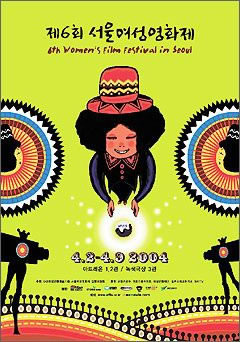
Thanks tonight to Naoki Yamamoto’s observations from the recent Feminist Artist Network Women’s Film Festival in Seoul, discussion turned to the degree to which students in Japan and Korea are politically engaged, and to the nature of this engagement.
See the course description
for this seminar.
Course pages, Autumn 2004
Undergraduate:
Academic Presentations I
Discovering Others II
Critical Cultural Theory II
Culture, Meaning, and Film
Graduate:
Cultural Studies
Policy Studies Forum
Orientalism

